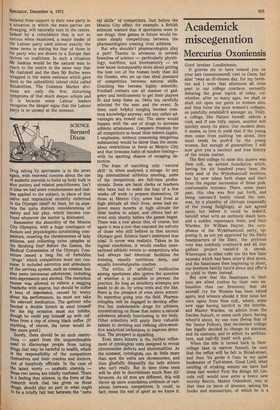SCIENCE
Bernard Dixon
Drug taking by sportsmen is in the news again, with renewed concern about the use of anabolic steroids to build up body bulk in Shot putters and related .practitioners. Isn't It time we had some commonsense and realism applied to the subject, in place of that naive and impractical morality enthrined In the Olympic ideal? At least, let us, separate the quite distinct considerations of safety and fair play, which become confused whenever the matter is discussed.
Remember the absurdity of the Mexico City Olympics, with a huge contingent of doctors and physiologists scrutinising competitors, counting the chromosomes of lady athletes, and collecting urine samples at the finishing line? Before the Games, the Medical Commission of the Olympic Committee issued a long list of forbidden ' drugs ' which competitors must not consume. It included narcotics and stimulants Of the nervous system, such as cocaine, but also more innocuous substances, including anti-depressants and alcohol. The marathon runner was allowed to relieve a nagging headache with aspirin, but should he suffer a bout of depression, caused by worry about his performance, he must not take the relevant medication. The 'sprinter who fancied a double Scotch to steel himself for the big occasion must not imbibe, though he could pep himself up with caffeine from a cup of strong black coffee. (If anything, of course, the latter would do him more good.) Surely, there should be no such restrictions — apart from the unquestionable need to discourage people from taking drugs that may be harmful to health, which is the responsibility of the competitors themselves and their coaches and doctors, not of busybody officials. In the case of the latest worry — anabolic steroids these two issues are totally confused. There IS a feeling that science, in the form of the research work that has given us these drugs, should play no part in what ought to be a totally fair test between the 'natu ral skills' of competitors. Just before the Mexico City affair, for example, a British scientist warned that if sportsmen were to use drugs, then games in future would become simply competitions between the pharmacologists treating rival athletes.
But why shouldn't pharmacologists play a part? Thanks to advances in several branches of science — particularly physiology, nutrition, and biochemistry — we now know incomparably more about getting the best out of the human body than did the Greeks, who set up that ideal standard of competition between natural skills. Coaching has become highly scientific. Football trainers use all manner of gadgetry and medicaments to get their players fit and keep them so. Diets are carefully selected for the man and the event. In time, such helpful insights become common knowledge anyway, and any unfair advantages are ironed out. The same would happen with the use of drugs to increase athletic attainment. Complete freedom for all competitors to boost their talents (again, I emphasise, without consuming dangerous substances) would be fairer than the anomalous restrictions in force at Mexico City and that tiresome habit of random testing— with its sporting chance of escaping detection.
The hope of matching only 'natural skill' is, when analysed, a mirage. At any big international athletics meeting, some of the competitors are full-time professionals. Some are bank clerks or teachers who have had to make the best of a few weeks off work to prepare themselves. Of those at Mexico City, some had lived at high altitude all their lives, some had enjoyed many months at high altitude for their bodies to adapt, and others had arrived only shortly before the games began. There was a row about this, of course, but again it was a row that exposed the naivety of those who still believe in that ancient Olympic goal. Science hasn't destroyed that Ideal. It never was realistic. Taken to its logical conclusion, it would confine international athletic events to competitors who had always had identical facilities for training, equally nutritious diets, and equally knowledgeable coaches.
The critics of ` artificial ' medication among sportsmen also ignore the question of whether it is possible to prevent the practice. So long as desultory attempts are made to do so, by urine tests and the like, there is the prospect of even more scientific expertise going into the field. Pharmacologists will be engaged to develop effective but undetectable drugs for athletes, concentrating on those that mimic a natural substance already functioning in the body. Other scientists will apply their valuable talents to devising and refining ultra-sensitive analytical techniques to improve detection. The prospect is appalling.
Even more bizarre is the further refinement of cytological tests designed to reveal chromosome defects and abnormalities. At the moment, cytologists can do little more than spot the extra sex chromosome, and thus gleefully disqualify the lady athlete who isn't really. But in time these tests will be able to discriminate much finer differences. As all men are different, this will throw up more scandalous evidence of variations between competitors. It could, in fact, mean the end of sport as we know it.










































 Previous page
Previous page